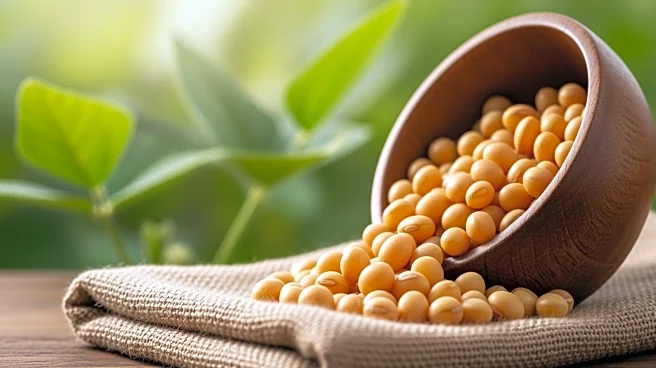What's Happening?
The Amazon rainforest is facing renewed threats of deforestation as Brazilian politicians and farming interests push to overturn a ban on the sale of soya grown on land cleared after 2008. This ban, known
as the Amazon Soy Moratorium, has been credited with significantly reducing deforestation in the region. However, as the COP30 UN climate conference progresses, critics argue that the ban unfairly restricts economic growth and favors a small group of powerful companies. Environmental groups warn that lifting the ban could lead to increased land grabbing and deforestation, potentially driving the Amazon towards a 'tipping point' where it can no longer sustain itself. The debate has divided the Brazilian government, with the Justice Ministry suggesting anti-competitive behavior, while the Ministry of the Environment and the Federal Public Prosecutors Office defend the moratorium.
Why It's Important?
The potential lifting of the Amazon Soy Moratorium poses significant environmental risks, as the Amazon rainforest plays a crucial role in global climate regulation. Increased deforestation could lead to a collapse of the rainforest ecosystem, releasing large amounts of carbon and disrupting weather patterns worldwide. This would have dire consequences for biodiversity and the millions of people who rely on the Amazon for survival. The issue also highlights the tension between economic development and environmental protection, with major implications for global food supply chains, particularly in countries like the UK, which source a significant portion of their soy from Brazil. The outcome of this debate could set a precedent for how environmental policies are balanced with economic interests in the future.
What's Next?
The Brazilian Supreme Court may reopen an investigation into the moratorium's alleged anti-competitive nature, which could lead to legal challenges and potential changes in policy. Meanwhile, Brazil is preparing to open a new railway that could further incentivize agricultural expansion into the rainforest. The COP30 summit continues to address these issues, with international stakeholders closely monitoring developments. Environmental groups are likely to intensify their advocacy efforts to maintain the moratorium, while farming interests push for its removal. The outcome of these discussions could influence future climate policy and international trade agreements.
Beyond the Headlines
The debate over the Amazon Soy Moratorium underscores broader ethical and cultural dimensions, including the rights of indigenous communities and small farmers affected by deforestation. It raises questions about the responsibility of global corporations in ensuring sustainable supply chains and the role of international pressure in shaping domestic policies. The situation also highlights the complex interplay between local economic needs and global environmental goals, challenging policymakers to find solutions that balance these competing interests.










